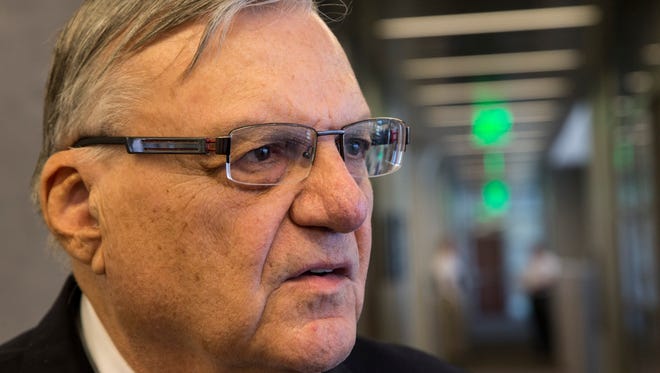Federal judge refers Ariz. sheriff for criminal contempt

PHOENIX — A federal judge said Friday that he will refer Maricopa County Sheriff Joe Arpaio to the U.S. Attorney’s Office to be charged with criminal contempt of court.
The decision comes after U.S. District Judge G. Murray Snow found that Arpaio intentionally violated various orders rooted in an 8-year-old racial-profiling case.
The ruling additionally refers Chief Deputy Jerry Sheridan, Arpaio's former defense attorney Michele Iafrate, and Capt. Steve Bailey for criminal contempt prosecution as well.
"Criminal contempt serves to vindicate the Court's authority by punishing the intentional disregard for that authority," Snow wrote in his Friday order.
Judge strips Arpaio of some internal affairs oversight
Snow’s decision, announced in a federal court filing, answers the key question looming over what has been more than a year of contempt proceedings: Was the disregard of orders a criminal or civil contempt-of-court violation?
But it creates a whole new set of legal questions for the embattled lawman.
• Will the U.S. Attorney’s Office accept the recommendation?
• What will the charge be?
• If Arpaio is found guilty, will a conviction legally force him to resign?
• Could Arpaio end up behind bars?
• Will Snow's decision affect his odds for a seventh term?
Reached for comment Friday evening, Arpaio said he hadn’t yet read the order but that it was being reviewed by his attorneys.
“We’re moving forward, we’re doing our job,” he said. “There’ll be aggressive appeals.”

Arpaio said he was looking forward to an “independent review,” clarifying that he meant a review by the U.S. Attorney’s Office.
Civil rights advocates, many who have attended courtroom hearings or protested outside of them for years, are celebrating what they see as a step toward what they have demanded for years: to hold Arpaio and his aides criminally responsible for his office’s racial profiling of Latinos.
But former U.S. Attorney Paul Charlton said there are few cases to look to for precedent. In a July interview, Charlton said he couldn’t think of another instance in which a federal judge had referred the head of a law-enforcement agency for criminal contempt.
“Fortunately in this country, it doesn’t happen,” Charlton said. “All of this is going to be relatively new in the U.S. Attorney’s Office.”
John Leonardo is the U.S. attorney for Arizona.
In May, Snow found Arpaio, Sheridan, Lt. Joe Sousa and former aide Brian Sands in civil contempt of court for violating three of the orders within a class-action racial-profiling case.
He has already begun meting out punishments for the civil-contempt finding, including reforms over the office’s internal-affairs department and a compensation fund for victims of illegal detention.
A LANDMARK CASE
The finding was yet another milestone in what has been a landmark case in Arizona, the state that emerged as ground zero for proponents of hard-line immigration reform in the mid-2000s.
Three years ago, Snow found that Arpaio’s deputies had routinely targeted Latinos during their traffic and saturation patrols. Although sheriff’s officials argued their policies enhanced public safety, critics came to see the tactics more as a deportation machine aimed at buoying Arpaio’s political image.
Ariz. rights group asks court to reconsider allowing workplace raids
Last year, though, Snow told sheriff’s officials to prove why he should not hold them in contempt after allegations that they had had violated three of his orders.
After 21 days of hearings in the spring and fall of 2015, Snow found that sheriff’s officials had, in fact:
• Continued to detain those suspected of being in the country illegally — but without suspicion of committing a state crime — after Snow banned the practice.
• Failed to turn over video evidence that had been required before trial.
• Failed to quietly gather video evidence from deputies after Snow ordered a discreet collection of material.
Arpaio and Sheridan admitted that the violations occurred but said they were the result of miscommunication rather than willful defiance. That distinction may have meant the difference between civil and criminal contempt.
Snow, who has become visibly impatient with Arpaio and Sheridan throughout the hearings, remained unconvinced by their defense.
He seemed to telegraph the criminal referral in his civil-contempt ruling, using the words “intentional” or “intentionally” 22 times to describe the office’s violations.
Charlton said it’s likely that federal prosecutors will take the case unless they have a conflict of interest. If that happens, the judge could appoint a special prosecutor.
Regardless, he stressed, Arpaio would have the same rights as any other defendant in a criminal trial. Like more than 90% of all criminal cases, he said, this one may result in a plea agreement or a pretrial disposition.

WEIGHING A CASE FOR CRIMINAL CHARGES
Potential penalties are steeper in a criminal case, and only criminal contempt could result in incarceration.
Throughout the hearings, Snow stressed that he would move for criminal charges if he believed the civil remedies were inadequate.
At times he seemed to air his internal monologue from the bench, inviting both sides’ attorneys for their legal opinion.
In a May hearing, Snow talked about how Arpaio’s aides may be subject to a number of penalties — including termination — under the civil-contempt finding. But because Arpaio was an elected official, options for the one Snow had found “most culpable” were more limited.
“The one person I can’t put at risk (to have) skin in the game is your client,” Snow told Arpaio’s defense attorney at the time. “I can’t touch him in a civil-contempt proceeding.”
It is unlikely that Leonardo would decline the case. But another case against Arpaio was declined four years ago.
In August 2012, federal prosecutors announced they would not be filing charges against Arpaio or former county attorney Andrew Thomas — an anticlimactic result of a four-year investigation into civil-rights violations, misuse of public money and perjury.
The announcement did not absolve them of wrongdoing. Rather, the case was declined because of a lack of evidence.
